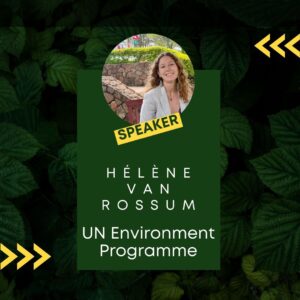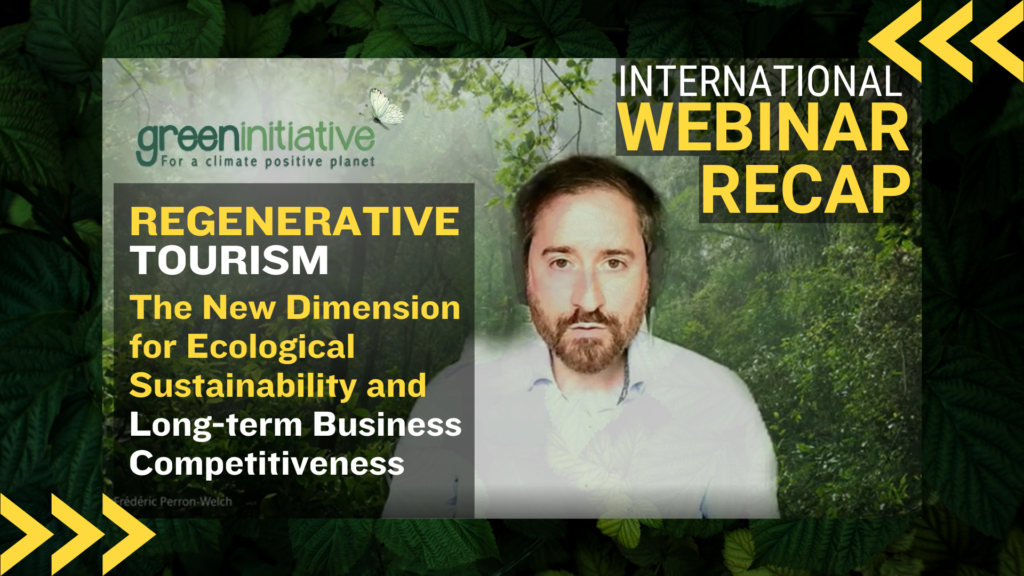On August 28, 2024, the Green Initiative hosted an exceptional international webinar titled “Regenerative Tourism: The New Dimension for Ecological Sustainability and Long-Term Business Competitiveness.” The event brought together a diverse group of experts, industry professionals, and global stakeholders to discuss the transformative potential of regenerative tourism. The webinar provided attendees with invaluable insights into how regenerative tourism practices are not only reshaping the future of travel but also contributing to global sustainability goals.
Frédéric Perron-Welch, Head of Climate and Nature Policy at Green Initiative, kicked off the webinar with a warm welcome.
“Regenerative tourism is not just about sustainability; it’s about restoring and enhancing the ecosystems and communities that make tourism possible,” said Perron-Welch, emphasizing the core philosophy of the event.
Keynote Presentations
Marcos Vaena – Senior Executive at IFC
Marcos Vaena provided a comprehensive overview of the International Finance Corporation’s (IFC) Environmental and Social Performance Standards, illustrating how they align with the principles of regenerative tourism. He highlighted the synergies between green finance and regenerative practices, particularly in emerging markets.
“In today’s world, going beyond sustainability is crucial for destinations that want to differentiate themselves in a competitive marketplace. Regenerative tourism offers a blueprint for long-term success by ensuring that tourism projects do not adversely impact the natural assets that these countries possess,” Vaena stated.

He also discussed how IFC’s performance standards, which include guidelines on labor conditions, community health, and biodiversity conservation, are critical in boosting competitiveness in the tourism sector.
Virginia Fernandez-Trapa – Programme Coordinator, UN World Tourism Organization
Virginia Fernandez-Trapa presented a compelling discussion on the “Regenerate Pathway” of The Glasgow Declaration. She emphasized that concept challenges conventional tourism practices by focusing on not only preserving but actively restoring ecosystems.
“The regenerate pathway challenges us to go beyond conventional practices, focusing on restoring ecosystems and supporting nature’s ability to draw down carbon”, said Fernandez-Trapa

She highlighted how the regenerate pathway is central to the goals of the Glasgow Declaration and emphasized the need for a balanced approach that incorporates environmental, social, and economic pillars of sustainable development.
“At present and in alignment with the Glasgow Declaration pathways for us is clear, that regenerative can certainly play a role in accelerating the pace of change towards the needed balance, so that we can ultimately ensure sustainable development of our societies, and we need to integrate those regenerative arteries and policies and actions”, she added.
Tenisha Brown-Williams – Senior Tourism Specialist, Inter-American Development Bank
Tenisha Brown-Williams captivated the audience with compelling case studies from Barbados and Brazil, showcasing how regenerative tourism can lead to transformative change. She shared the story of Walker’s Reserve in Barbados, a former quarry transformed into a thriving ecotourism destination, and the IDB‘s Salvador program in Brazil, which empowers Afro-Brazilian communities through regenerative tourism.

“I want to bring us all to one common point of agreement. We can all agree that in spite of the debates around sustainable turism and regenerative…. I think we could agree that given the climate crisis and other pressing vulnerabilities the global tourism industry must embrace in a new approach, so it is imperative for all stakeholders within the tourism value chain to adopt, what is called a transformative mindset, and this shift really involves moving beyond purely economic objectives to embrace the holistic reflections, which I have highlighted… On some rhetorical questions, we need to ponder: it’s tourism a benefit to the people at the destination or to the tourists?, said Brown-Williams.
“I want to propose that a mind cannot be transformed without visible proof of change and tangible evidence of its impact. So the IDB’S Tourism sector framework has a line of action which deals with original knowledge agenda for the tourism sector that covers important issues for which there is a lack of information. We also need to continue to inspire by sharing examples which strengthen community based tourism enterprises such as the examples shared in Belize, the Bahamas and Dominica, with elements of regenerative tourism at it’s core”, she added.
“I propose that the future of regenerative tourism hinges on our collective recognition that it is a mindset shift, brought to life through strategic policies and programs, and fully realized through robust partnerships across the entire tourism value chain. It is in this unified understanding and collaborative effort that we will shape a truly regenerated future for the global tourism industry. As we face unprecedented challenges, regenerative tourism offers a path forward that benefits both people and the planet. By fostering inclusive, community-driven initiatives, we can ensure that tourism serves as a powerful tool for positive change and long-term resilience,” she concluded.
In closing, Tenisha Brown-Williams emphasized the critical importance of regenerative tourism as a transformative force within the industry. She called on all stakeholders to embrace this new approach, which prioritizes not only environmental sustainability but also social equity and cultural preservation.
Inspiring Case Studies
Gabriel Meseth – Project Manager, Inkaterra Hotels
Gabriel Meseth presented Inkaterra’s pioneering efforts in ecotourism and sustainable development in Peru, focusing on their initiatives in the Amazon rainforest and the Machu Picchu cloud forest. He highlighted the successful restoration of these areas and the innovative waste management strategies that have made Machu Picchu the first carbon-neutral UNESCO Designated Site.

“Inkaterra’s approach to regenerative tourism is deeply rooted in scientific research and community engagement. By restoring ecosystems and empowering local communities, we are not only preserving Peru’s natural heritage but also setting new standards for sustainable tourism worldwide,” Meseth explained.
He also discussed the importance of public-private partnerships in achieving these ambitious goals, citing the collaboration between Inkaterra, the Green Initiative, and local communities as a model for other regions.
André Fortunato – Program Manager, CEPA (Customized Educational Programs Abroad)
André Fortunato shared CEPA’s innovative approach to regenerative tourism through their study abroad programs in Costa Rica and Guatemala. He emphasized the importance of service learning and climate-positive actions in educating students and supporting local communities.

“Through our programs, students not only learn about sustainability but actively contribute to it. Whether it’s planting trees or building infrastructure, these hands-on experiences are crucial in fostering a new generation of leaders committed to regenerative practices,” said Fortunato.
He also highlighted CEPA’s Climate Positive Fund, which has made significant contributions to biodiversity conservation and community development in Central America, reinforcing the organization’s commitment to regenerative tourism.
“To further cement the work towards a more eco-friendly world CEPA works together with Green Initiative and other organizations towards Regenerative Tourism and Corporate Social Responsibility. With Green Initiative, CEPA aims restore and protect ecosystems in the Osa Peninsula and, consequently, building the roads towards CEPA being a climate positive organization. Even though CEPA is on a very good track towards that goal, this work needs to stay consistent and this partnership needs to continue to be as fruitful as it has been.”, concludes André.
Global Perspectives on Biodiversity and Restoration
Oliver Hillel – Senior Expert in Biodiversity Mainstreaming
Oliver Hillel provided a global perspective on the challenges and opportunities in biodiversity restoration within the context of regenerative tourism. Drawing on his extensive experience with the Convention on Biological Diversity, Hillel emphasized the need for a holistic approach that integrates tourism with efforts to protect and restore biodiversity.

“Regenerative tourism must go beyond mere conservation; it should actively contribute to the restoration and resilience of ecosystems. By doing so, we can create tourism destinations that are not only sustainable but also regenerative, offering long-term benefits for both nature and local communities,” Hillel stated.
He also discussed the importance of establishing best practices and guidelines for regenerative tourism, which can be adopted and enforced by governments to ensure sustainable development.
Hélène Van Rossum – Programme Management Officer, UN Environment Programme
Hélène Van Rossum provided an overview of the UN Decade on Ecosystem Restoration, highlighting the critical role of partnerships in scaling up restoration efforts. She discussed how the principles of ecosystem restoration align with regenerative tourism, showcasing successful projects that generate economic returns through sustainable tourism.
“Ecosystem restoration is not just about healing the planet; it’s about creating sustainable livelihoods and building resilience in communities. The synergy between restoration and regenerative tourism offers a powerful model for achieving both environmental and economic goals,” van Rossum remarked.

Van Rossum also emphasized the importance of integrating restoration efforts with existing frameworks, such as the Sustainable Development Goals (SDGs) and international conventions on climate change and biodiversity. “The UN Decade on Ecosystem Restoration aims to build a global movement that not only reverses environmental degradation but also empowers communities to thrive through sustainable practices,” she added.
Notable Guest Contribution
Among the webinar participants, Anthea Iso, founder of Green Dreamcatcher South Africa, shared her inspirational journey of promoting regenerative tourism in her community. Drawing on her experience of overcoming the challenges posed by apartheid, Anthea highlighted the importance of empowering marginalized communities through tourism.
“You can build the most wonderful strategies and policies, but you need the people to make it work—especially those who have been most affected by exclusion and environmental degradation,” Anthea passionately stated.
She shared how her organization has focused on mobilizing women in townships, emphasizing that they are the backbone of community development.
Conclusion
The webinar concluded with closing remarks from Frédéric Perron-Welch, who reiterated the importance of collaborative efforts in advancing regenerative tourism. He thanked all participants and speakers for their contributions and expressed hope that the insights shared during the webinar would inspire continued action in the pursuit of ecological sustainability and business competitiveness.

“Regenerative tourism is not just a trend; it’s a necessary evolution of how we approach tourism in the face of global challenges. This webinar has shown us that by working together, we can create a tourism industry that not only sustains but regenerates our planet,” Perron-Welch concluded.
Green Initiative’s Call to Action
The success of this international webinar underscores the growing momentum behind regenerative tourism. Together, we can create a tourism industry that contributes positively to the planet and its people.
The Green Initiative Team extends our heartfelt thanks to the speakers for their availability and invaluable contributions. It was a true honor to have your participation in such a significant event. Your thoughtful insights and the engaging topics discussed made the webinar an enriching experience for all attendees.
Connect with us for expert advisory on achieving a successful pathway to sustainability and long-term competitiveness in you business organizaton, and make sure to link with our webinar speakers on LinkedIn: Frédéric Perron-Welch, Marcos Vaena, Virginia Fernandez-Trapa, Tenisha Brown-Williams, Oliver Hillel, Hélène van Rossum, André Fortunato, and Gabriel Meseth.
“Regenerative tourism is a new dimension within sustainable tourism; it’s a key strategy for the future of our planet and long-term business competitiveness. At Green Initiative, we believe that by integrating sustainability into every aspect of the tourism experience, we can create lasting value for communities, ecosystems, tourists, and businesses that actively support regenerative initiatives. This webinar has shown that when we collaborate across sectors, we can drive meaningful change and set new standards,” concludes Yves Hemelryck, CMO of Green Initiative and Head of Forest Friends.

